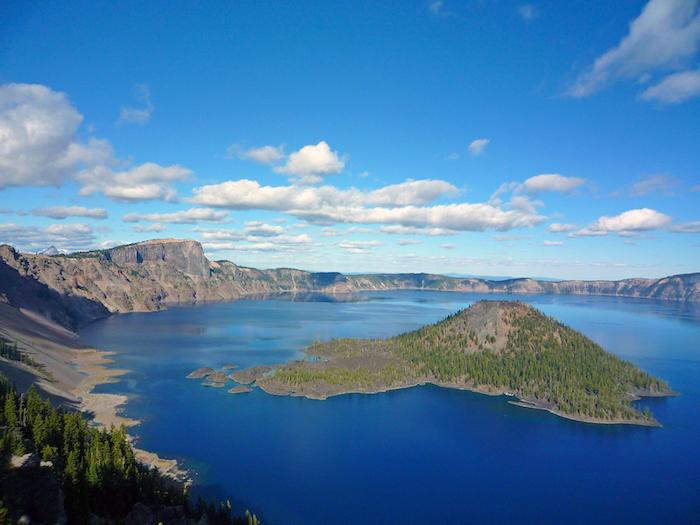
Will a warming climate cause Crater Lake to lose its iconic blue hue?/NPS
Will Crater Lake National Park continue to be such a popular park if its deep blue water wasn't so blue, but perhaps a murkier hue due to algae blooms? That's a question to consider in light of predictions that warming air temperatures will affect both the lake's water temperature and water column mixing.
A report issued this week by the U.S. Geological Survey warns that warming air temperatures over the next few decades holds the potential to impact not only the clarity of Crater Lake, but also its health.
Researchers from the USGS, University of Trento in Italy, and Crater Lake National Park analyzed how climate conditions currently affect the fundamental temperature characteristics and water-column mixing processes in Crater Lake, the deepest lake in the United States and one of the clearest in the world.
“We used a one-dimensional computer driven model that was developed specifically for cold, deep lakes to predict mixing events in Crater Lake under six climate scenarios to the year 2100, using wind, solar radiation and atmospheric temperatures as inputs,” said Tamara Wood, lead USGS scientist on the study that was released Wednesday. “Each climate scenario estimates a different severity of warming over time.”
The USGS modeling showed that warming of the atmosphere caused by climate change could disrupt the deep mixing process in Crater Lake. As the atmosphere warms, deep mixing events will likely become less frequent. Under the least severe warming scenario, deep mixing will occur on average once every three years by 2100. Under the most severe scenario, deep mixing could stop completely.
Mixing of the water column to the bottom in some exceptionally deep lakes requires a special combination of extremely cold water in the upper water column in winter and strong wind events that push that layer of cold water to one side of the lake. Given the right conditions, a plume of cold water can sink to the lake bottom. The deep mixing process requires the presence of cold air in winter. If the surface water does not become colder and denser than the deeper water, deep-water mixing will not occur.
These deep-water mixing events have two major effects on the Crater Lake ecosystem. As the plumes of cold water sink, deeper water is forced upward, which causes upwelling of nutrients that contribute to the growth of algae and can thus affect water clarity. Likewise, these sinking plumes of water are the critical process that replenishes dissolved oxygen near the lake bottom that is otherwise depleted by the decomposition of algae. Organisms that live in the deeper regions of Crater Lake depend on these mixing events in winter to provide the dissolved oxygen needed for survival.
Predicting the effect these changes will have on the ecology of Crater Lake and its famous water clarity will require models that combine the deep-mixing model results with factors that affect algal growth and oxygen use by deep-lake organisms.
“Crater Lake is, of course, well-known for its stunningly clear water and blue color,” said Scott Girdner, a lake biologist at Crater Lake National Park and participant in the study. “So changes in climate that may affect water clarity are of particular interest to the park from a lake-health perspective.”




 Support Essential Coverage of Essential Places
Support Essential Coverage of Essential Places







Comments
It seems to me winter snow avalanches into the ice-free lake could have substantial mixing effects, as could occasional landslides and large rockfalls. All of these type events probably have complex feedback loops involving climate change.
When will you recognize that all these "potential over the decades" apocolypse stories are pure hooey.
http://www.npr.org/sections/13.7/2016/05/04/476717308/after-10-years-an-...
Given how horribly wrong the predictions of the past have been, why do you give new ones based on the same psuedo science any credibility?
If you were addressing me, ec, my answer would be that the idea more and more humans can use more and more resources without environmental consequences defies common sense and is the real 'pure hooey'. As they're fond of saying in AA, 'Denial ain't just a river in Eygpt'.
ICYM Jimmy Kimmel (~7 min): https://www.youtube.com/watch?v=9UCdFbyL8y0
my answer would be that the idea more and more humans can use more and more resources without environmental consequences defies common sense
Yes, man can have environmental consequences - at least temporarily- but "climate change" does appear to be one of them. Common sense indicates that mans contibution to the climate is miniscule relative to other factors and so does the evidence. The predictions based on human caused climate change "science" have been horribly wrong. Rather than your "common sense" I will rely on the reality.
Ah, Esteemed Comrade, you say that climate change appears to be one of the consequences of human activities and then argue against it.
"but "climate change" does appear to be one of them."
There seem to be a lot of contradictions among the deniers of science. Common sense indeed tells us that human impacts are radically changing many of the ecological systems on our fragile planet. Climate is just one of many.
So we are glad that you may be starting to see the light.
;-}
Good catch Lee. I accidentally omitted the "not" but the evidence and the failed predictions haven't. No wonder you focused on my ommision rather than refuting the facts.